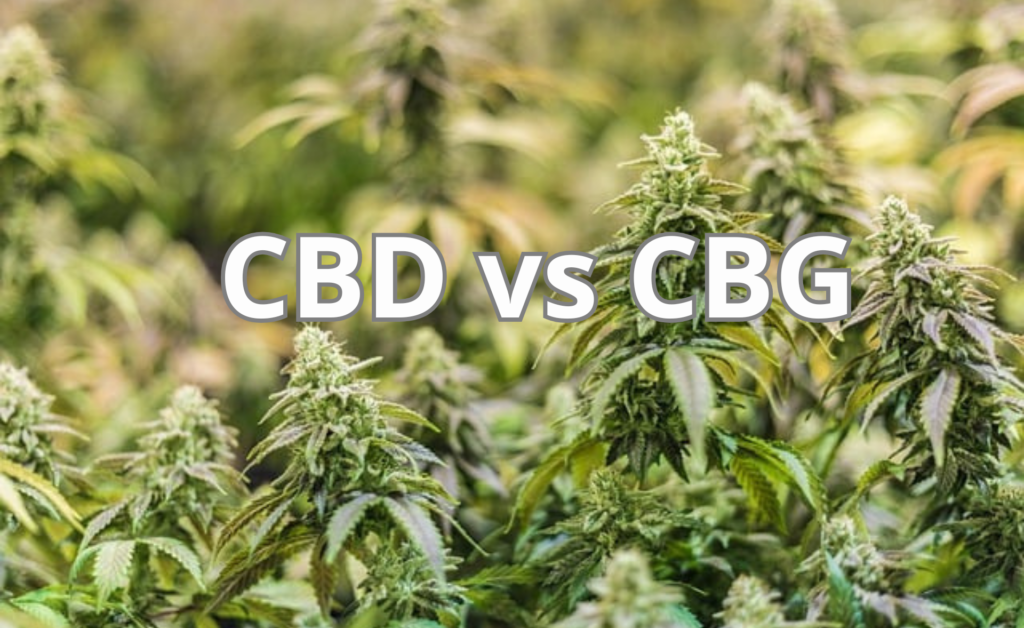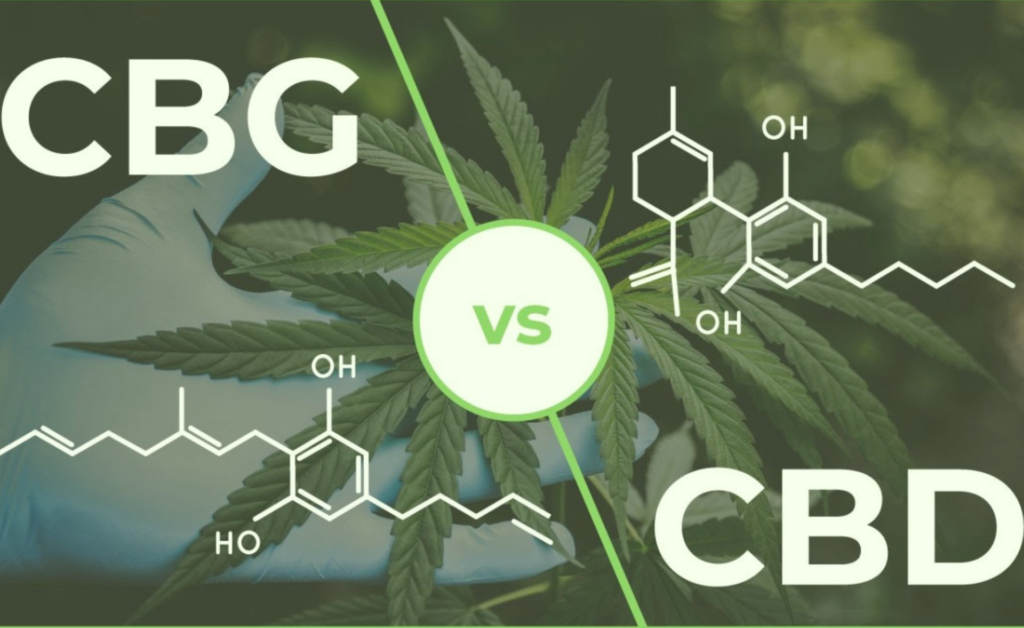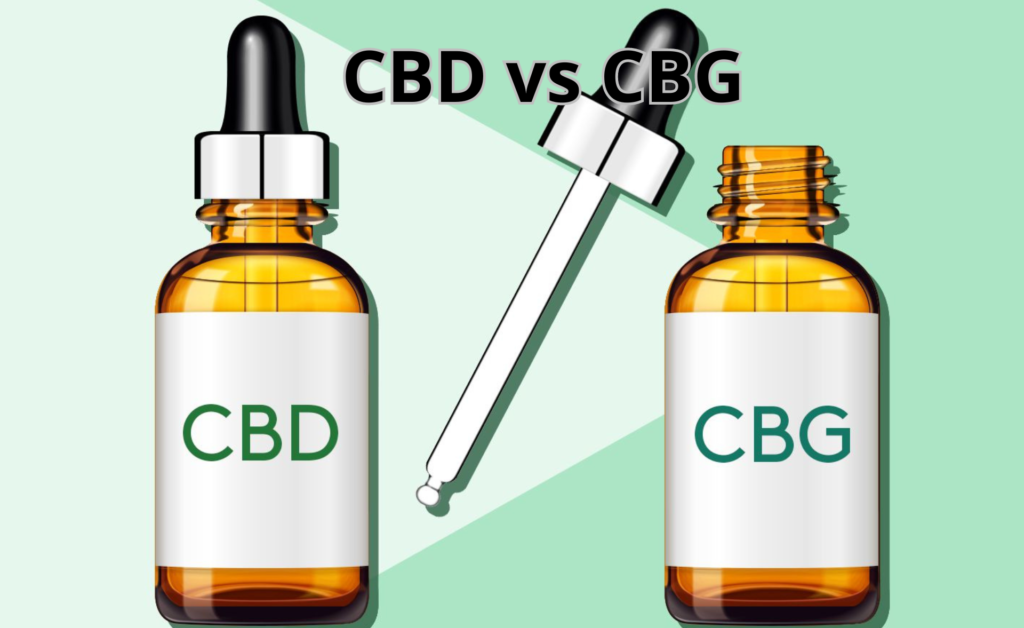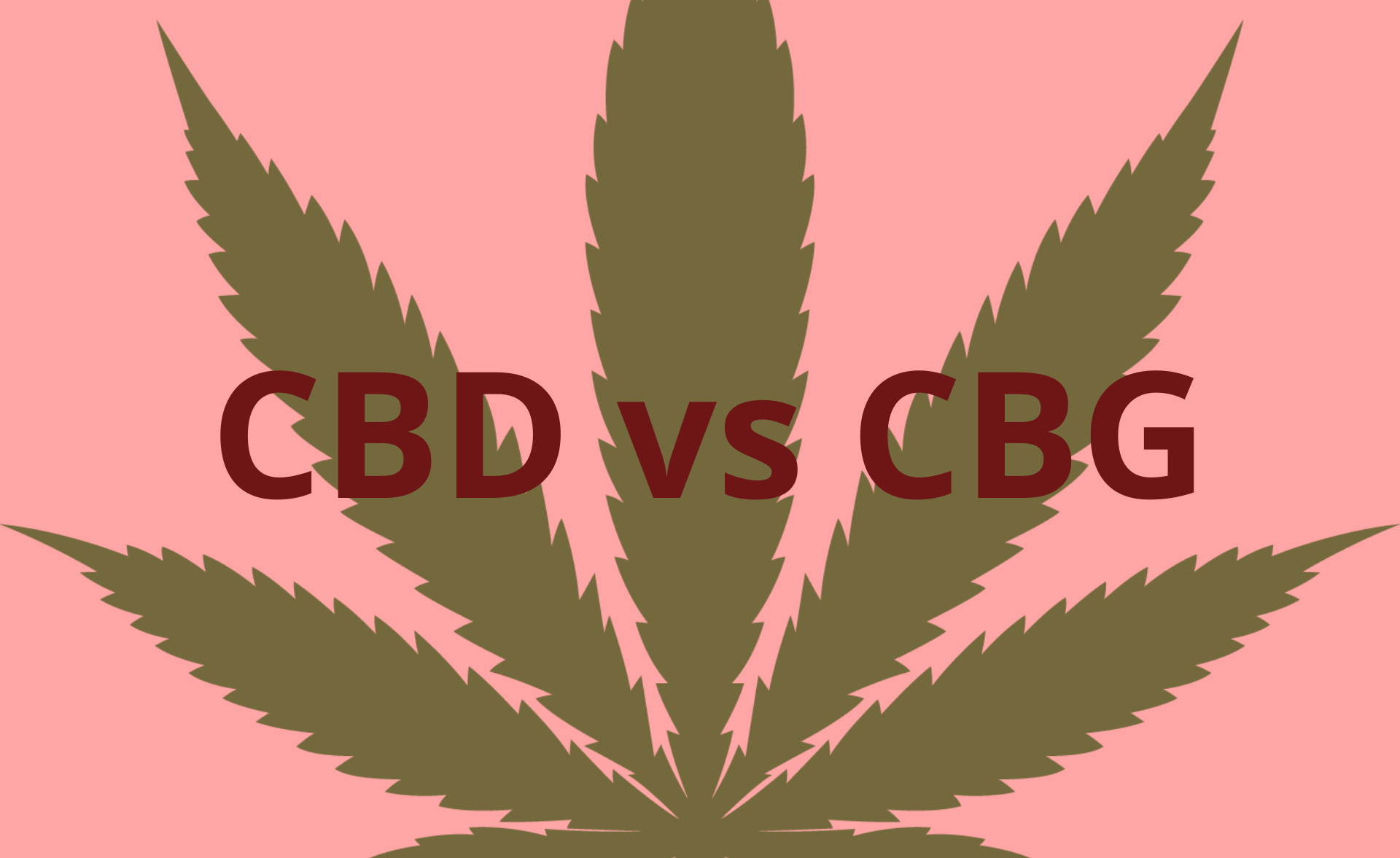CBD vs CBG: Benefits & Effects Compared
As the popularity of cannabinoids has soared in recent years, two compounds have emerged as potential game-changers:CBD vs CBG.
While both are cannabinoids with similar origins, there are distinct differences between CBD and CBG in terms of their chemical makeup and potential therapeutic benefits. If you’re considering using one or both of these compounds, it’s important to understand their unique properties and how they compare to each other.
In this article, we’ll provide an overview of the benefits and effects of CBD vs CBG, exploring the differences between the two cannabinoids and providing a detailed comparison of their therapeutic potentials. Whether you’re new to the world of cannabinoids or a seasoned user, read on to discover how CBD vs CBG could impact your health and wellness goals.

Table of Contents
CBD vs CBG:Understanding CBD and CBG
CBD and CBG are two of the most widely known and researched cannabinoids found in the cannabis plant. While they share similarities, they have distinct differences in their chemical makeup, potential benefits, and how they interact with the body’s endocannabinoid system.
What Is CBD?
CBD, short for cannabidiol, is a non-psychoactive compound found in the cannabis plant. It is typically derived from hemp, a variety of cannabis that contains minimal THC. CBD interacts with the body’s endocannabinoid system, which is responsible for regulating various bodily functions like sleep, mood, and appetite.
What Is CBG?
CBG, or cannabigerol, is another non-psychoactive cannabinoid found in the cannabis plant. It is considered a minor cannabinoid, as it is present in much lower levels than CBD or THC. CBG is believed to have various potential health benefits, including reducing inflammation and pain relief. It works by interacting with the endocannabinoid system in a similar way to CBD.
One key difference between CBD and CBG is the way they are extracted. CBD is usually extracted from the mature hemp plant, while CBG is typically extracted from the cannabis plant’s early growth stage. This makes CBG much rarer and more expensive than CBD.
CBD vs CBG:Chemical Composition Comparison
| Cannabinoid | Chemical Formula | Psychoactive | Is it Legal? |
|---|---|---|---|
| CBD | C21H30O2 | No | Legal under federal law |
| CBG | C21H32O2 | No | Legal under federal law |

In terms of chemical composition, both CBD and CBG have 21 carbon atoms and two oxygen atoms in their molecular structures. However, CBG has an extra hydrogen molecule than CBD, resulting in their different effects on the body.
Overall, while CBD and CBG may have overlapping potential benefits, they have distinct chemical and biological properties that make them unique. Understanding these differences can help you make an informed decision when choosing which cannabinoid is right for your individual needs.
CBD vs CBG:Unique Benefits of CBD
While CBD and CBG share many similarities, CBD has unique benefits that set it apart from its counterpart. Numerous studies have demonstrated the efficacy of CBD in treating various health conditions, making it a popular choice for medical and wellness purposes.
Reducing Anxiety
One of the most well-known benefits of CBD is its potential for reducing anxiety. Multiple studies have shown that CBD can ease symptoms of anxiety disorders, such as generalized anxiety disorder and social anxiety disorder, without causing the psychoactive effects associated with THC.
“CBD has shown therapeutic efficacy in a range of anxiety disorders, including panic disorder, social anxiety disorder, obsessive-compulsive disorder, post-traumatic stress disorder, and generalized anxiety disorder.” – National Library of Medicine
Pain Relief
CBD has also shown promise in relieving pain associated with various conditions, such as arthritis and multiple sclerosis. It works by interacting with the body’s endocannabinoid system, which helps regulate functions such as pain perception and inflammation.
“CBD may offer an option for treating different types of chronic pain. A study from the European Journal of Pain showed, using an animal model, CBD applied on the skin could help lower pain and inflammation due to arthritis.” – Harvard Health Publishing
Other Health Conditions
CBD has been studied for its potential in treating numerous other health conditions, such as epilepsy, acne, and cancer-related symptoms such as nausea and vomiting. While more research is needed, the existing studies show promising results.
| Condition | Evidence of CBD’s Potential Benefits |
|---|---|
| Epilepsy | CBD has been shown to reduce seizures in people with epilepsy, even when other treatments are ineffective. In fact, the first FDA-approved CBD medication is used to treat rare forms of epilepsy. |
| Acne | CBD has demonstrated anti-inflammatory properties that may be effective in treating acne, a condition caused by inflammation. It has also been shown to reduce sebum production, which can contribute to acne. |
| Cancer-related symptoms | CBD has been shown to reduce nausea and vomiting caused by chemotherapy, as well as pain and other symptoms associated with cancer and its treatments. It may also have anti-cancer properties, although this requires further study. |
Overall, CBD offers a range of potential benefits for numerous health conditions. While further research is needed to fully establish its efficacy, the existing studies and user reports suggest that CBD may be a valuable addition to anyone’s health and wellness routine.
Whete to buy CBD vs CBG online : top bramd where to find good quality of CBD and CBG in united states is Binoid

CBD vs CBG;Unique Benefits of CBG
While CBD has gained widespread popularity for its therapeutic benefits, CBG is gaining recognition for its unique set of benefits. CBG, like CBD, is a non-psychoactive cannabinoid found in the hemp plant.
One of the key benefits of CBG is its potential as an anxiety-relieving agent. A 2016 study found that CBG had a significant anxiolytic effect in rats by activating specific receptors in the brain responsible for regulating anxiety.
CBG may also be effective in reducing inflammation and pain, making it a promising alternative to traditional pain medications. A 2008 study found that CBG had anti-inflammatory effects on the gut, while a 2015 study found that it had potential anti-inflammatory properties for treating inflammatory bowel disease.
CBG for Pain Relief:
| Study | Result |
|---|---|
| A 2008 study | found that CBG had anti-inflammatory effects on the gut |
| A 2015 study | found that it had potential anti-inflammatory properties for treating inflammatory bowel disease |
CBG may also have potential as an anti-cancer agent. A 2014 study found that CBG inhibited the growth of colorectal cancer cells in mice, while a 2016 study found that it had potential anti-tumor properties for treating bladder cancer.
As with CBD, CBG is being explored for its potential as a treatment for neurological disorders. A 2015 study found that CBG had neuroprotective properties that could potentially be useful in treating Huntington’s disease.
Overall, while CBG may not yet be as well-known as CBD, it offers unique potential benefits that make it an exciting area of research in the world of cannabinoids.
CBD vs CBG for Anxiety
Anxiety disorders affect millions of individuals worldwide and often lead to long-term disabilities. CBD and CBG are two cannabinoids that have shown potential for alleviating anxiety symptoms.
CBD, or cannabidiol, is non-psychoactive and works by interacting with the body’s endocannabinoid system to regulate mood and reduce stress levels. Studies have shown that CBD may also help alleviate symptoms of generalized anxiety disorder, social anxiety disorder, and post-traumatic stress disorder.
CBG, or cannabigerol, is another cannabinoid that has shown promising results in treating anxiety. CBG works by interacting with serotonin receptors in the brain, similar to how traditional antidepressant medications work. A study on CBG showed promise in reducing anxiety and promoting a general feeling of calmness in rats.
Benefits of CBD vs CBG for Anxiety
| CBD | CBG | |
|---|---|---|
| Effectiveness | Clinical studies have shown CBD to be effective in reducing anxiety symptoms | Animal studies have shown promising results, but human studies are scarce |
| Safety | Generally considered safe, but may cause side effects such as fatigue, diarrhea, and changes in appetite | Generally considered safe, but may cause mild side effects such as dry mouth and dizziness |
| Legality | Legal under federal law if derived from hemp plants with less than 0.3% THC | Legal under federal law if derived from hemp plants with less than 0.3% THC |
| Availability | Widely available in various forms, including oils, capsules, and gummies | Less widely available than CBD, but can be found in select products such as tinctures and capsules |
While CBD and CBG both show promise for alleviating anxiety, more research is needed to fully understand the extent of their effectiveness and any potential adverse effects. It’s important to consult with a healthcare provider before trying any new treatments for anxiety or other health conditions.
CBD vs CBG for Pain Relief
When it comes to managing pain, both CBD and CBG have shown promise in reducing discomfort and inflammation. CBD is perhaps better known for its pain-relieving effects, backed by numerous studies and user testimonials. It works by interacting with the body’s endocannabinoid system, which regulates pain perception and inflammation. CBD is also believed to activate serotonin receptors, which can help reduce pain and improve mood.
CBG, on the other hand, is a lesser-known cannabinoid that has been gaining attention for its potential pain-relieving effects. Like CBD, it interacts with the endocannabinoid system, but it may work differently to reduce pain. Studies suggest that CBG may have a stronger analgesic effect than CBD, making it a promising alternative for managing pain.
| CBD | CBG | |
|---|---|---|
| Mechanism of Action | Interacts with the endocannabinoid system; activates serotonin receptors | Interacts with the endocannabinoid system; potential increased analgesic effect |
| Effectiveness | Well-documented effectiveness in managing pain and reducing inflammation | Less research in humans, but emerging studies suggest potential for pain relief |
| Types of Pain | Effective in managing neuropathic pain, arthritis, and menstrual cramps | Promising results for managing inflammatory and nerve-related pain |
It’s important to note that everyone’s experience with pain is unique, and what works for one person may not work for another. Both CBD and CBG offer potential pain relief with minimal side effects, and may be used in combination with other pain management strategies. Consult with a healthcare professional before using any cannabinoids, especially if you are taking any medications.
CBD vs CBG: A Comprehensive Comparison
When comparing CBD and CBG, it’s essential to dive into their similarities and differences. Here is a breakdown of how these two cannabinoids stack up:
| Comparison | CBD | CBG |
|---|---|---|
| Chemical Structure | CBD has 21 carbon atoms, 30 hydrogen atoms, and 2 oxygen atoms. | CBG has 21 carbon atoms, 30 hydrogen atoms, and 2 oxygen atoms. |
| Extracted from | CBD is mainly extracted from hemp plants and marijuana plants. | CBG is extracted from young cannabis plants, usually before flowering. |
| Psychoactive Properties | CBD is non-psychoactive and does not produce the “high” effects. | CBG is non-psychoactive and does not produce the “high” effects. |
| Legality | CBD is legal in all states of the US. | CBG is not yet widely available and is still in the gray area when it comes to legality. |
| Potential Side Effects | Common side effects of CBD may include fatigue, diarrhea, and changes in appetite. | Although CBG is generally considered safe, more research is required to identify potential side effects. |
| Uses | CBD is commonly used for anxiety relief, reducing inflammation, and managing pain. | CBG is known to have antibacterial properties and may be helpful in treating glaucoma, neurodegenerative diseases, and inflammatory bowel disease (IBD). |
| Bioavailability | CBD has relatively low bioavailability, with only a certain amount of it absorbed into the bloodstream when consumed orally. | CBG also has relatively low bioavailability when consumed orally. |
As shown in the comparison above, while CBD and CBG have a few similarities, there are also significant differences between them. It’s essential to understand these variations when considering the use of either cannabinoid.

CBD vs CBG Oil: Which Is Right for You?
If you are considering incorporating cannabinoids into your wellness routine, you may be wondering whether CBG or CBD oil is right for you. While both offer potential therapeutic benefits, there are some key differences to consider when making your decision.
Production Methods
One significant difference between CBG and CBD oil is their production methods. CBD oil is derived from the leaves, flowers, and stems of the hemp plant using an extraction process that removes other cannabinoids and plant substances. CBG, on the other hand, is typically extracted from the young hemp plant during its flowering stage, before it has had a chance to convert to other cannabinoids. This means that CBG extraction typically requires more plant material and is therefore more costly.
Consumption Options
Another factor to consider is how you prefer to consume your cannabinoids. CBD oil is typically taken orally, either by placing drops under the tongue or mixing it into food and drinks. Alternatively, CBG can be taken in various forms, including tinctures, capsules, and even inhalation using a vaporizer.
Therapeutic Potentials
While both cannabinoids have potential therapeutic uses, research is ongoing, and additional studies are needed to fully understand their efficacy. CBD oil is well-known for its potential to help alleviate symptoms related to anxiety, stress, pain, and inflammation. CBG, on the other hand, may offer benefits for glaucoma, inflammatory bowel disease, and even certain types of cancer.
Ultimately, the choice between CBG and CBD oil will depend on your specific needs and preferences. Consulting with a healthcare professional and conducting further research can help you make an informed decision.
Potential Side Effects of CBD and CBG
While CBD and CBG are generally safe to use, they can cause side effects in some individuals. Understanding the potential risks is essential, especially if you have underlying health conditions or take medications.
Common Side Effects of CBD
CBD can cause some mild side effects, including:
- Dry mouth: CBD may decrease saliva production, leading to dry mouth.
- Dizziness: High doses of CBD can cause dizziness or lightheadedness.
- Low blood pressure: CBD may cause a temporary decrease in blood pressure.
- Sedation: CBD can make you feel relaxed or drowsy.
- Changes in appetite: CBD may affect your appetite, leading to increased or decreased hunger.
Common Side Effects of CBG
The side effects of CBG are not well-studied, but some people may experience:
- Dry mouth: CBG may decrease saliva production, leading to dry mouth.
- Dizziness: High doses of CBG can cause dizziness or lightheadedness.
Differences Between CBD and CBG Side Effects
The side effects of CBD and CBG are similar, but CBD may cause more pronounced sedation and changes in appetite. CBG may have fewer side effects overall, but more research is needed to confirm this.
Note: It’s essential to talk to your healthcare provider before using CBD or CBG, especially if you have underlying health conditions or take medications. They can help you understand the potential risks and benefits, and suggest appropriate dosages and modes of administration.
Exploring the Synergistic Effects of CBD and CBG
While CBD and CBG each offer a variety of potential therapeutic benefits, recent research has suggested that combining the two cannabinoids may result in greater synergistic effects.
One study found that combining CBD and CBG resulted in a greater reduction of inflammation and pain in rats than either cannabinoid alone. Another study suggested that a combination of CBD and CBG could be more effective in managing symptoms of epilepsy than CBD alone.
The exact mechanism behind these potentially enhanced effects is still unclear, but researchers speculate that CBD and CBG may work together to regulate the body’s endocannabinoid system more effectively.
It’s worth noting that while combining CBD and CBG may offer additional benefits, it may also result in increased side effects or drug interactions. As always, it’s important to consult with a healthcare professional before starting any new supplement regimen.
CBD vs CBG:Conclusion
After exploring the benefits and effects of CBD and CBG, as well as their differences, it’s clear that both cannabinoids offer unique therapeutic potential. While CBD has been widely studied for its potential benefits in managing anxiety and pain relief, CBG has shown promising applications in these areas as well.
When choosing between CBD and CBG, it’s essential to consider your specific needs and preferences. Consult with healthcare professionals and conduct further research to determine which cannabinoid may be most suitable for you. It’s also important to note that combining CBD and CBG may offer synergistic effects, potentially enhancing their therapeutic benefits.
Ultimately, both CBD and CBG are exciting and rapidly evolving areas of research, with significant potential for improving health and well-being. As research into these cannabinoids continues, we can expect to gain further insights into their mechanisms of action and potential applications.



Post Comment